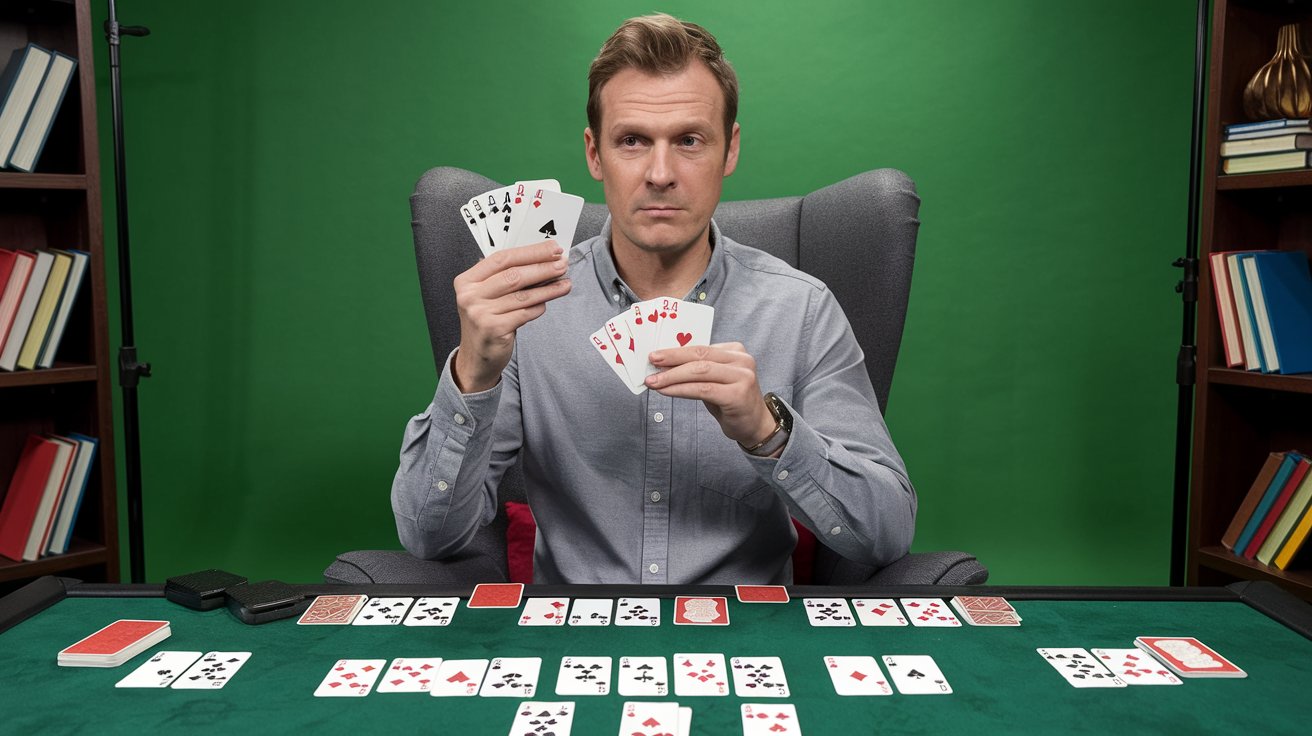Rummy has long been celebrated as a game of skill, strategy, and psychological warfare. As you progress from beginner to advanced levels, you soon discover that the true challenge lies not just in forming melds or discarding cards but in managing and outsmarting multiple opponents simultaneously. In this comprehensive guide, we’ll explore advanced strategies designed specifically for handling multiple adversaries in Rummy. Whether you’re competing in a high-stakes tournament or enjoying a multi-player casual game, these tactics will elevate your play, boost your confidence, and give you the competitive edge you need.
Understanding the Multi-Opponent Challenge

When playing Rummy with multiple opponents, the dynamics of the game shift dramatically compared to a one-on-one match. The complexity increases as you have to:
-
Monitor Several Players Simultaneously: Unlike in head-to-head games, you must track the moves, discards, and potential strategies of several opponents at once.
-
Assess Varied Playing Styles: Each opponent brings a unique approach, forcing you to adapt your tactics in real-time.
-
Manage Unpredictable Outcomes: Multiple players increase the likelihood of unexpected moves, forcing you to adjust quickly and remain flexible.
The Impact on Game Strategy
Handling several opponents means that you need to expand your awareness beyond your own cards. Every discarded card, every sudden change in strategy, and every unanticipated move can provide vital clues about what your opponents are holding. This heightened level of complexity calls for a deeper level of strategy, which we’ll unpack throughout this blog.
Keywords: advanced rummy, multiple opponents, rummy strategy, multi-player Rummy tactics
Advanced Observational Skills

One of the most powerful tools in an advanced Rummy player’s arsenal is keen observation. When multiple opponents are involved, your ability to read the game becomes your best asset.
Tracking Opponent Moves
-
Analyze Discards: Every time a player discards a card, ask yourself: Why did they let that card go? Could it be that they are trying to conceal a sequence or set? Keeping mental notes of discards across all opponents can help you deduce their strategy.
-
Monitor Pick-Ups: Notice which cards are being picked from the discard pile. If an opponent is consistently selecting certain types of cards, they might be working towards a specific meld.
-
Pattern Recognition: Look for patterns in behavior. Some players may adopt a defensive strategy while others play more aggressively. By recognizing these tendencies, you can better predict their future moves.
Using Technology and Memory Aids
While you can’t use electronic devices during a live game, you can train your memory and analytical skills through practice. Here are some techniques to help sharpen your observational skills:
-
Mental Note-Taking: Practice recalling the cards that have been discarded in previous rounds during practice sessions.
-
Simulation Software: Online Rummy platforms often have features that allow you to replay games. Use these replays to analyze your opponents’ moves in detail.
Keywords: advanced rummy observational skills, opponent analysis, multi-player card tracking
Strategic Card Management
Effective card management is crucial when the competition is fierce. Handling multiple opponents means you must not only create your own winning combination but also disrupt your opponents’ potential melds.
Organizing Your Hand for Maximum Efficiency
-
Sort by Suit and Sequence: Quickly organizing your cards can help you spot potential sequences and sets, making it easier to react to the game’s evolving dynamics.
-
Keep Flexible Options: Avoid locking yourself into a single strategy too early. Maintain flexibility so that you can adapt if you notice an opponent is targeting a particular card or combination.
-
Conceal Your Strategy: Be mindful of how you arrange your cards. Keeping your intended melds less obvious can prevent opponents from predicting your moves.
Intelligent Discarding
Your discards can serve dual purposes: advancing your game plan while hindering your opponents.
-
Defensive Discarding: When multiple opponents are in play, consider discarding cards that could complete common sequences or sets. This defensive move minimizes the risk of inadvertently helping someone else.
-
Risk Management: Sometimes holding on to a card for too long can backfire if an opponent picks up on your intentions. Evaluate the risk-reward ratio of keeping versus discarding based on the current state of the game.
-
Forced Plays: In some scenarios, discarding a card that might seem useful to you can force an opponent into making a suboptimal move, shifting the momentum in your favor.
Keywords: strategic card management, advanced discarding techniques, rummy hand organization
Balancing Offense and Defense

When facing multiple opponents, a balanced approach between offense and defense becomes essential. This balance allows you to capitalize on opportunities while minimizing the chances of inadvertently aiding your opponents.
Offensive Strategies
-
Aggressive Meld Formation: Don’t hesitate to form melds early if you see a clear path to victory. This can put pressure on your opponents and force them to adapt their strategies.
-
Disruptive Moves: Sometimes, the best offense is a good defense. If you notice an opponent nearing a winning combination, consider making moves that disrupt their plans, even if it means slightly delaying your own strategy.
Defensive Strategies
-
Watch the Table: Keep a close eye on the discard pile. Understanding what cards are already in play can inform your defensive strategy and help you avoid discarding cards that might benefit your opponents.
-
Selective Card Holding: While it’s important to form melds, holding onto certain cards for defensive purposes can prevent opponents from capitalizing on available opportunities.
-
Calculated Risk: Defense in a multi-player game often involves taking calculated risks. Know when to hold back and when to push forward. Sometimes, letting an opponent win a small battle can be the best way to secure a larger victory later.
Keywords: offense and defense in rummy, advanced rummy strategies, balanced gameplay
Psychological Tactics and Bluffing
The psychological aspect of Rummy is amplified in multi-opponent games. Your ability to manage not only your own mindset but also to influence your opponents’ perceptions can create a significant advantage.
Mastering the Art of Bluffing
-
Feign Weakness: Sometimes, showing a lack of enthusiasm for a seemingly good hand can mislead your opponents about your true strategy. This can prompt them to make moves that benefit your game plan.
-
Mixed Signals: Your discards and moves can send mixed signals. For example, discarding a high-value card might suggest you’re not collecting a particular sequence, even if you are.
-
Controlled Risk: Bluffing isn’t about taking reckless risks. It’s about carefully weighing your moves and choosing the right moments to mislead your opponents without jeopardizing your own position.
Psychological Resilience
-
Stay Focused: In a game with multiple opponents, distractions are inevitable. Practice mindfulness and deep focus techniques to maintain your concentration.
-
Emotional Control: Remain calm under pressure. Emotions can cloud judgment and lead to hasty decisions. Maintaining composure helps you think clearly and react appropriately to unexpected moves.
-
Observe Reactions: Pay attention to how your opponents react to your moves. This can offer clues about their confidence levels and potentially reveal their strategies.
Keywords: rummy bluffing, psychological tactics in rummy, multi-opponent strategy
Adapting Your Strategy in Real-Time
No matter how well you prepare, a multi-player game of Rummy is dynamic and unpredictable. The ability to adapt quickly to new developments is key to staying ahead.
Reading the Game’s Rhythm
-
Pacing Your Moves: Adjust your play speed according to the game’s flow. If the game becomes too slow, you might need to speed up your decision-making to keep opponents off balance.
-
Flexible Game Plans: Always have a backup plan. If your initial strategy becomes compromised by an opponent’s unexpected move, be ready to shift gears and adopt an alternative approach.
-
Continuous Assessment: Regularly evaluate your opponents’ actions and the current state of the game. This ongoing assessment helps you identify potential threats and opportunities, allowing you to pivot your strategy as needed.
Decision-Making Under Pressure
-
Quick Calculations: Multi-opponent scenarios require rapid mental calculations. With each move, quickly assess the potential outcomes for all players at the table.
-
Prioritize Key Moves: Not every decision carries the same weight. Learn to differentiate between moves that are critical to your success and those that can be adjusted later.
-
Learn from Each Round: Whether you win or lose a round, analyze the decisions that led to the outcome. Over time, these insights will help you refine your ability to adapt in real-time.
Keywords: adaptive rummy strategies, real-time decision-making, multi-player game adaptation
Practicing Under Multi-Opponent Conditions
Like any advanced skill, mastering the art of handling multiple opponents in Rummy requires dedicated practice. By simulating high-pressure scenarios and learning from your experiences, you can steadily build your strategic prowess.
Setting Up Practice Sessions
-
Simulated Multi-Player Games: Use online platforms or local game nights to practice with multiple opponents. The more exposure you get to varied playing styles, the better you’ll become at reading the table.
-
Timed Rounds: Introduce a timer during practice sessions to simulate the pressure of real tournaments. This helps sharpen your decision-making skills under time constraints.
-
Role Reversal: Occasionally, switch roles by intentionally altering your play style. This exercise not only enhances your adaptability but also gives you insights into how your opponents might think.
Learning from Experience
-
Game Reviews: After each session, review your gameplay. Identify critical moments where a different decision might have changed the outcome.
-
Feedback Loops: Engage with fellow players and mentors. Their insights can reveal blind spots in your strategy and suggest new techniques for improvement.
-
Document Your Progress: Keep a journal of your games, noting strategies that worked well and areas that need improvement. Over time, you’ll develop a personalized playbook for handling multiple opponents effectively.
Keywords: rummy practice strategies, multi-player practice sessions, advanced rummy training
Additional Advanced Techniques
Beyond the core strategies, several nuanced techniques can further refine your ability to handle multiple opponents.
Probabilistic Thinking
-
Calculate Odds: Understand the probabilities of drawing certain cards based on what has been discarded and what remains in play. This statistical approach can guide your decisions, particularly when deciding whether to risk holding onto a potentially useful card.
-
Risk Assessment: Evaluate not only your own hand but also estimate the potential value of your opponents’ hands. This involves understanding the game’s flow and using probability to inform your defensive and offensive moves.
Opponent Profiling
-
Identify Patterns: Over multiple rounds, observe individual player behaviors. Some opponents may consistently play aggressively, while others are more conservative. Use these profiles to tailor your strategy against each type.
-
Adjust Strategies Accordingly: If one opponent is particularly adept at bluffing or unpredictable moves, consider countering by playing more conservatively when interacting with them. Conversely, if another opponent tends to be overly cautious, you might leverage that by taking more calculated risks.
Leveraging In-Game Information
-
Track Card Flow: In a multi-player game, it’s crucial to know which cards are likely still in play. Constantly update your mental ledger of the cards that have been discarded, picked up, or remain in your hand.
-
Watch for Anomalies: Sometimes a player might make an unusual move that deviates from their typical strategy. These anomalies can provide valuable insights into their changing tactics or desperation to form a meld.
Keywords: probabilistic rummy, opponent profiling in rummy, in-game strategy insights
Final Thoughts and Next Steps
Advanced Rummy is a game where every decision counts, especially when you’re up against multiple opponents. By honing your observational skills, managing your cards strategically, and maintaining a balance between offense and defense, you can navigate even the most complex multi-player scenarios with confidence.
Recap of Key Strategies
-
Observational Excellence: Monitor discards, pick-ups, and patterns in your opponents’ behaviors.
-
Effective Card Management: Organize your hand and use intelligent discarding to thwart your opponents’ plans.
-
Balanced Offense and Defense: Aggressively form melds when the opportunity arises while preventing opponents from gaining the upper hand.
-
Psychological Tactics: Use bluffing and controlled risk-taking to keep your opponents guessing.
-
Adaptive Play: Continuously assess the game and adjust your strategy in real-time.
-
Dedicated Practice: Simulate multi-player conditions to refine your skills and build resilience under pressure.
Embracing the Complexity
Handling multiple opponents in Rummy is not just about playing cards; it’s about managing the intricacies of human behavior, probability, and strategy. Every game is an opportunity to learn, adapt, and improve. As you continue to hone these advanced skills, you’ll find that your ability to read the game, predict opponent moves, and execute decisive strategies will dramatically improve.
Next Steps for the Aspiring Advanced Player
-
Engage in Regular Multi-Player Sessions: Whether online or in person, the more you expose yourself to varied play styles, the more adept you’ll become.
-
Reflect on Each Game: Maintain a journal of your gameplay to identify strengths and areas for improvement.
-
Expand Your Knowledge Base: Read advanced strategy guides, watch expert gameplay videos, and participate in forums where you can exchange ideas with fellow advanced players.
-
Practice Mental Conditioning: Develop techniques such as mindfulness and focused breathing to enhance your concentration and decision-making under pressure.
Keywords: advanced rummy improvement, multi-opponent practice, rummy strategic development
Conclusion
Advanced Rummy, with its multifaceted challenges, offers a unique opportunity to refine not only your card skills but also your strategic thinking and psychological resilience. Handling multiple opponents requires a combination of sharp observation, tactical card management, balanced play, and continuous adaptation. By integrating these advanced techniques into your game, you position yourself to excel even in the most competitive settings.
The journey to mastery is ongoing. With each game, you learn more about your opponents, the nuances of probability, and the intricate dance of offense and defense. Embrace these challenges, and let every round be a stepping stone towards becoming a true Rummy strategist.
Whether you’re competing in a high-stakes tournament or simply enjoying a game with friends, these strategies will help you remain one step ahead of your opponents. Remember, the key to handling multiple opponents lies not in overwhelming them with aggression but in outsmarting them with thoughtful, calculated moves.
So, shuffle the deck, focus your mind, and prepare to dominate the table with advanced Rummy tactics that transform challenges into opportunities. The path to becoming a formidable multi-opponent Rummy player starts with practice, perseverance, and a willingness to adapt to the ever-changing dynamics of the game.

Zareb Saleh is a journalist at Gulf Today and a ghostwriter for Gameoholic, specializing in gaming, technology, and digital culture. With a keen eye for industry trends, he delivers insightful stories that engage and inform readers.




